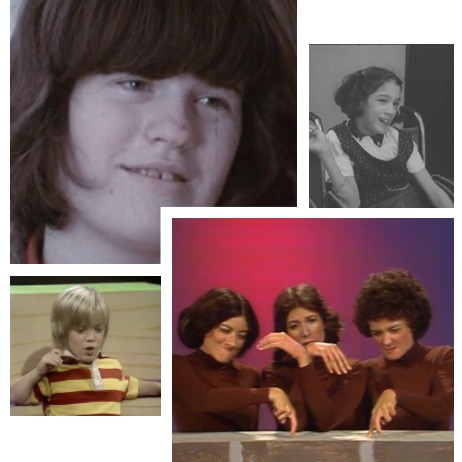Children and Disabilities Collection
Collection Summary
The Children and Disabilities special collection includes nearly 100 public television programs for and about children with disabilities. Programs date from the 1950s to the present; however, most were produced before 1980. The collection demonstrates that throughout its history, public media has created innovative programming at the forefront of efforts to improve accessibility and the representation of children with disabilities.
The collection includes programming for adults, such as episodes of The Exceptional Child (1959) and an episode of The Practical Parenting Series (1993), which aim to inform parents and teachers about the social, emotional, and educational needs of children with disabilities. The WQED television special The Puzzle Children (1976), hosted by Julie Andrews, uses songs and skits to educate viewers of all ages about learning disabilities in children. WQED’s Coming Home (1973) blends documentary and drama to tell the story of a young girl with an intellectual disability who confronts prejudices within her community.
Help us make this collection more accessible! Consider donating to our fundraising drive to add closed captions and audio descriptions to items in this collection.
The collection also showcases groundbreaking children’s programming, including the Emmy Award-winning Rainbow’s End (PBS, 1978–1979), the first nationally televised program for deaf children. Rainbow’s End episodes include lessons in American Sign Language and introduce children to deaf role models in sports, entertainment, and the arts. Episodes of the WGBH series Zoom (1972–1978; 1999–2005) feature film shorts focused on children with disabilities. In several of the episodes, the children who appear in the film shorts also engage in candid conversations on set with the Zoom cast. In Maryland Public Television’s Bob the Vid Tech, “Meeting the Challenge!” (2000), children with disabilities participate in outdoor activities, including horseback riding, camping, and sailing.
In recent years, public media has made strides in sharing the stories and perspectives of individuals with disabilities. However, many of the episodes in this collection are among the earliest and most groundbreaking. They attest to public media’s longstanding commitment to producing inclusive and accessible programming.
Collection Background
In 2024, the AAPB began working with the National Center for Accessible Media (NCAM) to create an online special collection showcasing historic public television programming for and about children with disabilities. Together, NCAM and AAPB staff identified nearly 100 programs for inclusion in the collection. However, because most of these programs were produced before 1980, they did not meet current accessibility standards.
The AAPB secured funding to make six programs accessible in accordance with current ADA standards for streaming video. These programs include audio descriptions provided by the Media Access Group at GBH as well as closed captions. Currently, the AAPB is raising funds to add closed captions and audio descriptions to additional programs included in the collection.






